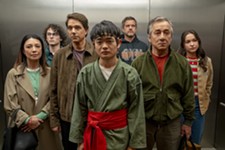SXQ&A: TMS Ruge
Project Diaspora co-founder and SXSW speaker talks African tech
By Richard Whittaker, 2:19PM, Sat. Mar. 13, 2010

Social entrepreneur and Project Diaspora co-founder TMS Ruge is a SXSW Interactive veteran. He'll be back on Sunday to bust some misconceptions about technology in developing nations during his talk Africa 3.0: A Look at the Future of a Connected Africa.
Austin Chronicle: You just got back from the Mobile Web East Africa Conference. What were the big takeaway points for you?
TMS Ruge: I think for me the passion and frustration from the entrepreneurs directed at the gate keepers hampering their innovations from successful market penetration was interesting. Safaricom was particularly vilified for it's slow response to embrace and nurture developer enthusiasm. They've been a market leader for several years and yet treat developers innovating on their platform with disdain and very little support. There's still no official SDK for the market-leading MPESA mobile payment platform! There was also particular interest in African developers finding unique ways to develop for the iPhone even though their countries were not supported by the Apple App store. The talent is there, keen to develop and innovate on world leading platforms and that's really exciting. It really cemented for me that the connected palm is the future in terms of connected devices as the platform of choice for innovation. We'll leap frog the lap top the very same way we leap-frogged desktops and land lines.
AC: To take a question from your panel proposal, can broadband really feed the hungry?
TR Broadband will feed the hungry, yes. Those that are hungry for information and a richer connected experience. Look, broadband is just another catalyst for job creation. Job creation begets wealth creation. Wealth creation begets poverty alleviation. Is broadband a panacea for poverty and its ills? No, but it's a powerful pill in the concoction of solutions that can be used to address poverty and feed the hungry. Information is powerful, empowering, and thus transformative.
If you look at digital communities like BOSCO, and WOUGNET in Uganda, you get to see first hand how effectively connected technologies are helping marginalized communities engage better in the world they live in.
Africa isn't without food or resources you see, but we are without adequate infrastructure systems to guarantee those with, are able to provide for those without. It's a systemic problem but access to information is helping the cause.
AC: There was a lot of discussion recently about the failure of facial recognition software and what Allyson Kapin calls inadvertent exclusion. How much of a problem is that, and from where does it stem?
TR: Visually interactive technologies have a long way to go I think, but it's a start. Unfortunately the race to be first often means bugs or deliberate functionality-crippling decisions are made. And in the market, it appears as if entire sections of the human race were not accounted for. Which is a shame really, if you are going to do facial recognition, especially here in the States, surely your R&D team has to think about the full spectrum of skin tones in this market. I mean, it's not as if you are designing these things exclusively for culturally homogeneous societies like Japan or China or pockets of Africa for that matter.
At the same time though, I can see instances where I think these companies weigh the benefits of launching with these short falls, vs waiting to make sure every bug is addressed. I think it just comes down to "Can you market presence of this product overcome the negative press in the short term while we attempt to fix or say we are going to fix the problem?" I think these companies are after first-mover advantage. Get the cash, fix the problem later, if warranted.
AC: What role do programs like One Laptop per Child play in the region?
TR: I'd have to say imported solutions like this have a limited role. See my points above. I'll admit that I'm a little conflicted on this one. Granted, OLPC's target market is limited as it serves a crucial role in introducing children to technology. And it does that beautifully. The ability to take the device home and use it on a daily basis cements that technology bridge. But I think it's entirely invasive as it is divisive. You have to remember that you are introducing technology into households that have never experienced technology before. They may perhaps have one mobile in the house (that everyone can use). Now you introduce this laptop geared to the child. What about the rest of the family? How immersive is the shared experience? How disruptive is this to the traditional way of life in that family? Children have a very particular role in the home after school.
AC: Is the biggest problem for introducing technology into and for developing nations that people don't understand what isn't there (such as reliable electrical grids) or that they don't appreciate what is there (such as the massive adoption of cell phones)?
TR: Well the assumption usually is that there isn't innovation on the ground, therefore they have to import what they know works for them. I think it's a bit of both really. I think the biggest problem is that no one takes the time to study the environment before introducing technological solutions. On the surface, there may not be an adequate electrical grid network, but there are solar and battery operated solutions. How can you augment already existing innovations and solutions?
The best thing to do is to build solutions from the ground up, using local talent and systems that are already in place. If you important technology or software solutions that have never been tested there or built without local input, then your top-down solutions are never going to work. OLPC is such an example. Much as he'd like to believe otherwise, (project founder Nick) Negroponte's pet project is never going to take off in Africa sustainably beyond the status of novelty. There's no locally innovated support structure, no local input. It's a prepackaged toy that some guy with money, and connections thinks is the best thing next to sliced bread.
When you look at stats like 90% of urban youth in South Africa have access to mobile phones, why would you innovate on anything else? The connected palm is the future of Africa, innovate there because the logistical issues that make that kind of technological penetration have been solved.
AC: There's been a rolling discussion about whether aid helps or hinders development. How damaging is the presumption that the only technology in, for example, Uganda is going to be second-hand or discounted Western kit?
TR: Well, the aid debate aside, assumptions are damaging whether you are in Austin, TX or Masindi, Uganda. The assumption that the only technology here in Africa is second-rate is patently false. I can point to innovations pioneered here in the last five years that have global implications: Mobile payment mechanisms, Ushahidi, and Mxit. Those are just three that already debunk that assumption. That's not to say we don't have second-hand kit here, we do, and it serves it's purpose. But we also have access to first-rate technologies. The iPhone is available in several countries in Africa, as is the Nexus One. So yes, such assumptions are just as damaging, but surprisingly in-line with the mainline image of Africa. We've been branded by Western media AND aid organizations as the clusterfuck of the world and that nothing good happens here. So why shouldn't assumptions on the technology here be any different?
AC: On that track, how much should foreign entities look at areas like Central and East Africa as places where aid-based development is required, and how much should they look at them as potential markets or potential centers for investment?
TR: My fiance warned me not to make assumptions about aid. I've gotten the reputation as being anti-aid and pro-trade. The truth is, we need both. There's a place for aid and there's a time for trade. Haiti needs as much aid as the world can shell out. But there will come a time when that aid needs to hand the reigns over to the private sector & local governments. Watch how easy that's going to be. It won't be. Central Africa needs sustained intervention, as well as economic development. East Africa needs economic development: marginalized communities, AIDS orphans, refugees need some aid to stabilize. Our work with Women of Kireka is a perfect combo of aid and economic development/investment. They need a little bit of aid to address things like their status as refugees, HIV/AIDS treatment and monitoring within their communities. From an economic stand point we look at them as vital business partners who produce goods worthy of international attention. We look at the of what they could become provided the appropriate amount of economic investment and training. The same with the farmers we work with in Masindi, Uganda. Huge economic and social entrepreneurship potential. I look at the big picture of farmers upgrading from subsistence farming with average earning of a dollar a day to $10 day. Multiply that across 1500 farmers in one community and you are looking at a sea change. My job as an investor in the sector IS to look at the market potential and nothing else.
Africa 3.0: A Look at the Future of a Connected Africa, Sunday, March 14 9:30am, Room 12AB, Austin Convention Center.
A note to readers: Bold and uncensored, The Austin Chronicle has been Austin’s independent news source for over 40 years, expressing the community’s political and environmental concerns and supporting its active cultural scene. Now more than ever, we need your support to continue supplying Austin with independent, free press. If real news is important to you, please consider making a donation of $5, $10 or whatever you can afford, to help keep our journalism on stands.
Carys Anderson, Feb. 27, 2024
Joelle DiPaolo, Feb. 23, 2023
Richard Whittaker, March 17, 2017
Josh Kupecki, Jan. 11, 2017
SXSW, SXSW Interactive, TMS Ruge, Project Diaspora, Safaricom, Bosco, WOUGNET, MXIT, One Laptop per Child, Ushahidi, Women of Kireka












